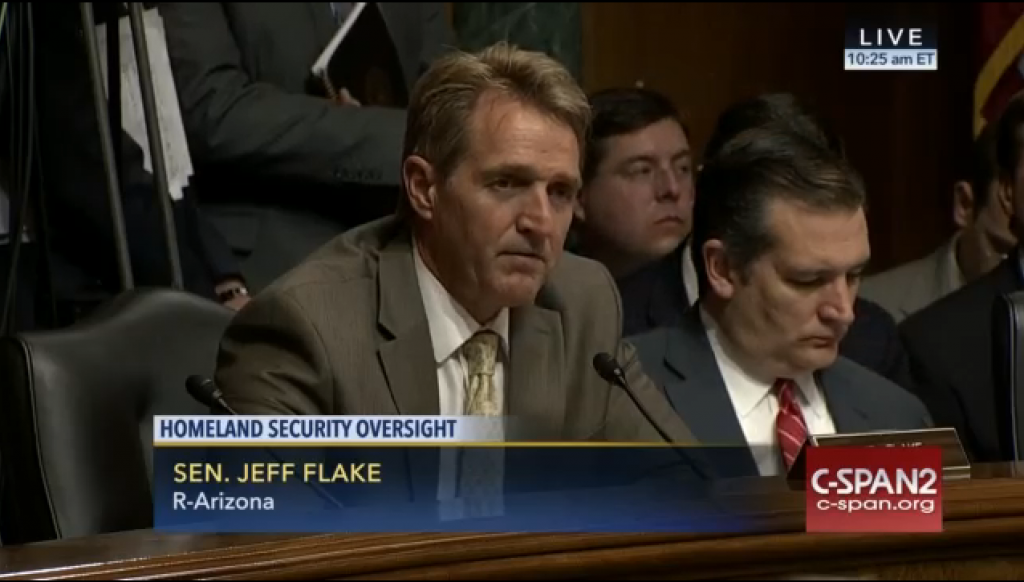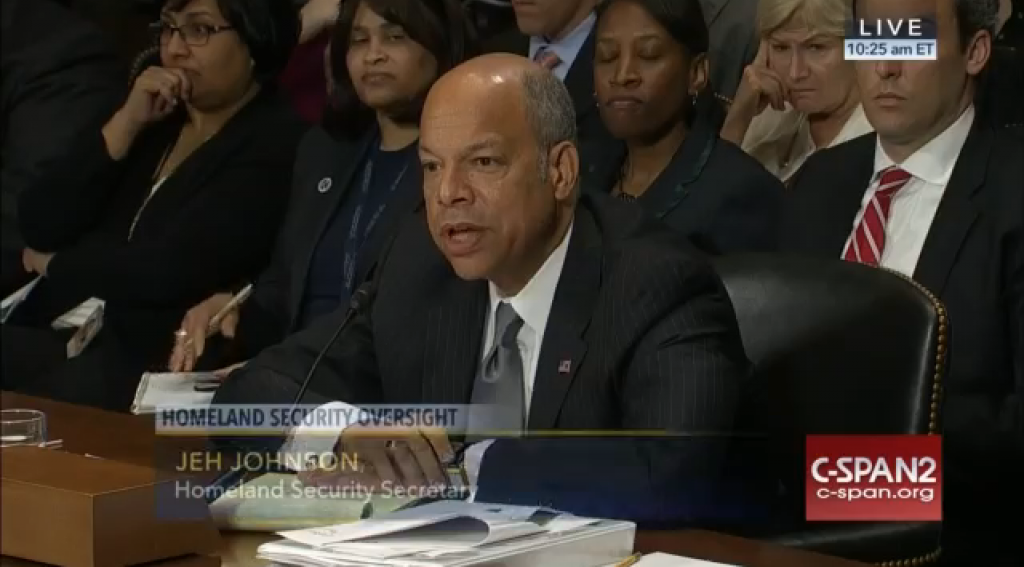
In a hearing of the U.S. Senate Committee on the Judiciary held Thursday, 30 June 2016, Senator Jeff Flake (R-AZ) expressed concern to Department of Homeland Security Secretary Jeh Johnson about the level of false positives in the U.S. Customs and Border Protection pre-employment polygraph program, and that such false positives amount to a “scarlet letter” for employment elsewhere in government. Sec. Johnson replied that he has asked his people to “take a hard look at” the concerns raised by Sen. Flake.

A transcript of the relevant portions of the hearing follows (emphasis added):
44:05-47:35
Sen. Flake: Let me talk for a minute about CBP hiring. As you know, Congress approved a staffing level, of — that’s well in excess of what we have on the ground there now. We’re short about 950 officers. We were told — I had a meeting where we were trying to get to the bottom of why it’s taking so long to hire some of these folks, and we’re told that for every 100 applications — every 100 applicants that apply, only one is hired. And a lot of people identify the polygraph that is taken for a lot of the false positives and concern that one false positive is a scarlet letter for any employment opportunity that might come up elsewhere in government. I know that there’s an issue there. Do you want to comment?
Sec. Johnson: Well, I have asked our folks to take a hard look at exactly what you just said. Is it — does it really need to be the case that one false positive disqualifies you from federal service — federal law enforcement service? I’m aware of the statistics you cite. One in 100, and the length of time it takes to hire somebody for the Border Patrol, for CBP. Senator, as I’m sure you know, we have surged our efforts through hiring hubs, through aggressive recruitment, aggressive recruitment among our military personnel, at military bases.
Sen. Flake: We did pass the Border Jobs for Veterans Act.
Sec. Johnson: Correct.
Sen. Flake: And were told that that’s moving the needle a bit.
Sec. Johnson: Correct. And I think we’re closing the gap. Slowly, I think we’re turing the corner and closing the gap so that we can hire up to what has been appropriated and authorized. You are correct that we are currently I think 950 short, but I ask CBP every time I see the senior leadership, “How are we doing on the hiring? Are we making a difference? Are we doing as much as we can?” And we seem to be closing the gap. But I do think that we ought to take a hard look at whether we’re shooting ourselves in the foot by, by you know, this very lengthy, cumbersome process that it takes to recruit and hire people and get them through all the vetting.
Sen. Flake: When you combine this with the high attrition rate there, we would have to accept, I think 100,000 applications. We’re not going to get even close to that. Just to get to the number, assuming one out of a hundred. So I would encourage you to look at some options here and figure how we can change the process because it’s not working and we’re severely understaffed at some of the ports of entry. A lot of people just see the border as, you know, something that maybe we ought to just put a wall or something to stop illegal entry. Certainly we have to have a secure border, but in Arizona, it’s also a hub of commerce, and that commerce can’t take place if we have too few agents there in these ports of entry. As you know, we’ve made a lot of investments in infrastructure there, but if we don’t have them staffed, it doesn’t do us much good.
The best way to address concerns about the polygraph program’s deleterious effects on CBP’s ability to fill vacancies is to scrap the polygraph program. Polygraphy has no scientific basis, and the National Academy of Sciences advised that “its accuracy in distinguishing actual or potential security violators from innocent test takers is insufficient to justify reliance on its use in employee security screening in federal agencies.”
While polygraphy is inherently biased against truth-tellers (retired CIA polygrapher John Sullivan has concluded that at the CIA, “…an honest subject has no better chance than a dishonest subject of getting through the process”), it is easily sidestepped by liars through the use of simple countermeasures (see Chapter 4) that polygraph operators cannot detect.
It should be noted that in 2014, CBP polygraph chief John R. Schwartz falsely claimed that sophisticated polygraph countermeasures can be routinely identified. The falsity of Schwartz’s claim is borne out by a set of CBP polygraph case files leaked to AntiPolygraph.org.
By relying on the unreliable pseudoscience of polygraphy, CBP is subjecting the many truthful applicants who wrongly fail the polygraph to unfair blacklisting while undermining national security and public safety. No reform can make up for polygraphy’s lack of scientific underpinnings. Polygraph screening should be abolished.
Skepticism and concern about the use of the polygraph as a “lie detector” is growing in the courts and now in the Senate. Could this be the beginning of a movement to stop the madness of polygraph “testing”? We can only hope and pray. I urge those of you who have been victimized by the fraud of “lie detection” and have been falsely accused of deception to write your senators and representatives – and particularly Sen. Jeff Flake. Also, the government employee unions need to make their voices heard on this issue and seek the same protection for their members as that afforded to those in private industry by the EMPLOYEE POLYGRAPH PROTECTION ACT.
hello I took the polygraph for CBP on 20160118 and the machine indicated that I lied on the question that said if I’m hiding a serious crime I’m currently a federal employee with the DOD for 19 years and in the United States Army Reserve that currently hold a secret clearance and is on a active tour in DFAS Cleveland just because of that question I did not pass the polygraph so now I’m waiting on an appeal I have applied for others federal jobs and if any of those federal jobs offer me the position I will take it’s sad that customs is losing a lot of good people through this polygraph exam.
How do you go through with the appeal I also know someone that had the same situation. Bogus claims and a very unprofessional exam, he wanted to know how to file an appeal as well as reporting the examiner?